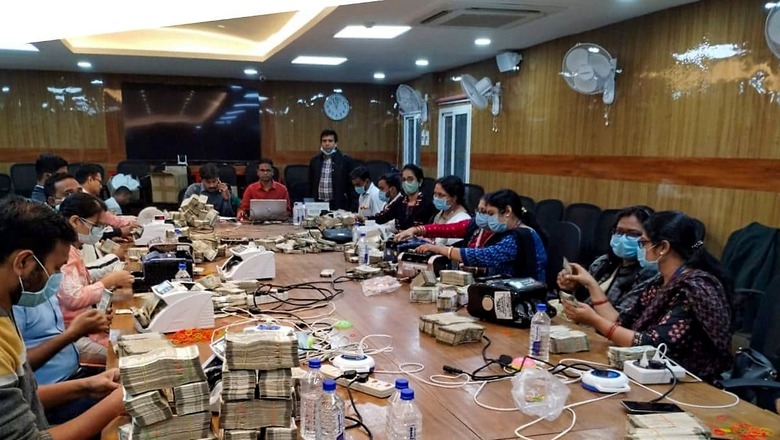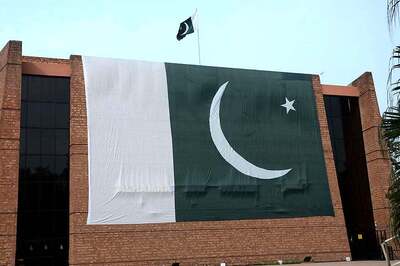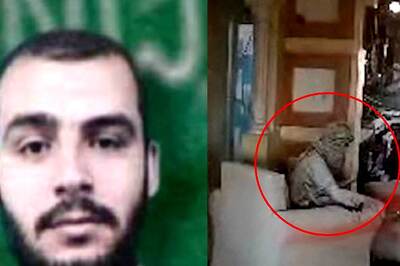
views
In “highest-ever” haul by any probe agency, the Income Tax Department conducted raids on properties in Odisha linked to Baldeo Sahu and Group of Companies Ltd, a country liquor company run by Congress Rajya Sabha MP from Jharkhand Dhiraj Prasad Sahu.
The IT raids at premises of the Congress MP in Ranchi and other places have led to cash seizure of Rs 351 crore, making it the highest-ever haul by an agency in a single operation. The marathon raids, launched by IT department on December 6, against Boudh Distillery Private Limited, its promoters and others finished after five days of counting on Sunday.
As the IT department finishes the highest-ever cash seizure made by an agency in the country reaching Rs 351 crore, here’s all you need to know about where will the cash go and how does the government make use of the seized currency.
Biggest-ever Haul in the Country
IT Department personnel first raided BDPL on allegations of tax evasion and later searched the premises of Baldeo Sahu and Group of Companies Ltd. Simultaneous raids were also conducted in Titlagarh, Sambalpur, Sundargarh and Bhubaneswar in Odisha and in a few places in Jharkhand.
According to IT department sources, around 30 places were raided linked to Baldeo Sahu and Group of Companies Ltd since December 6, the highest amount of cash recovered — in 156 bags — was from one of its manufacturing units at Sudapada in Balangir in Odisha.
The counting involved nine teams of about 80 people from the tax department and various banks, working in shifts in a 24×7 cycle. Another team of 200 officials, including security personnel, drivers and other staff, joined in after the taxman found 10 almirahs stuffed with cash apart from some other locations.
As many as 200 bags and trunks were used to transport the cash for depositing it in various bank branches in Odisha, the sources said. Bhagat Behera, the SBI regional manager, said that nine counting machines were deployed initially, but 16 additional machines have been arranged to expedite the process.
How is an IT Raid Done?
A team from the investigation wing of the Income Tax Department carries out the search operations. The search team carries a search warrant to legally carry out the operation.
According to Section 132(1) of the Income Tax Act, raids are authorized by Principal Director General or Director-General, or Principal Director or Director, or Principal Chief Commissioner or Chief Commissioner, or Principal Commissioner or Commissioner.
When the central agencies like IT, the Enforcement Directorate (ED) or the Central Bureau of Investigation (CBI) conduct raids, they seize unaccounted money and other assets, but they can’t keep the recovered cash with them.
What happens to the cash?
The cash is seized by the government agencies under the Prevention of Money Laundering Act (PMLA) and the IT department calls the officials of the State Bank of India (SBI) to count the recovered cash.
In case of the raids at Dhiraj Prasad Sahu’s premises too, the State Bank of India officials were involved in counting of the seized money.
After the counting, the agency involved in the raid prepares a seizure list in the presence of bank officials. The seizure list includes details including the total amount of cash recovered, and the number of currency notes and their denominations like Rs 500 and 100.
The money is sealed in boxes in the presence of independent witnesses and a seizure list is made. The recovered cash is sent to an SBI branch in that state where it is deposited under a Personal Deposit (PD) account of the agency.
Under the Income Tax Rules, “Personal Deposit Accounts are maintained with specified branches of the SBI or the RBI offices, for depositing money seized from persons suspected of Tax Evasion.”
Can the Govt Use the Cash?
It is pertinent to note that neither any central agency nor the SBI or the government can use the seized money.
The agency issues a provisional attachment order and an adjudicating authority is required to confirm the attachment in six months. They money is kept lying in the bank until the trial ends in the case.
If the accused is convicted, then the cash amount becomes property of the Centre and if the accused is acquitted by the court, then the cash is returned to the owner.




















Comments
0 comment